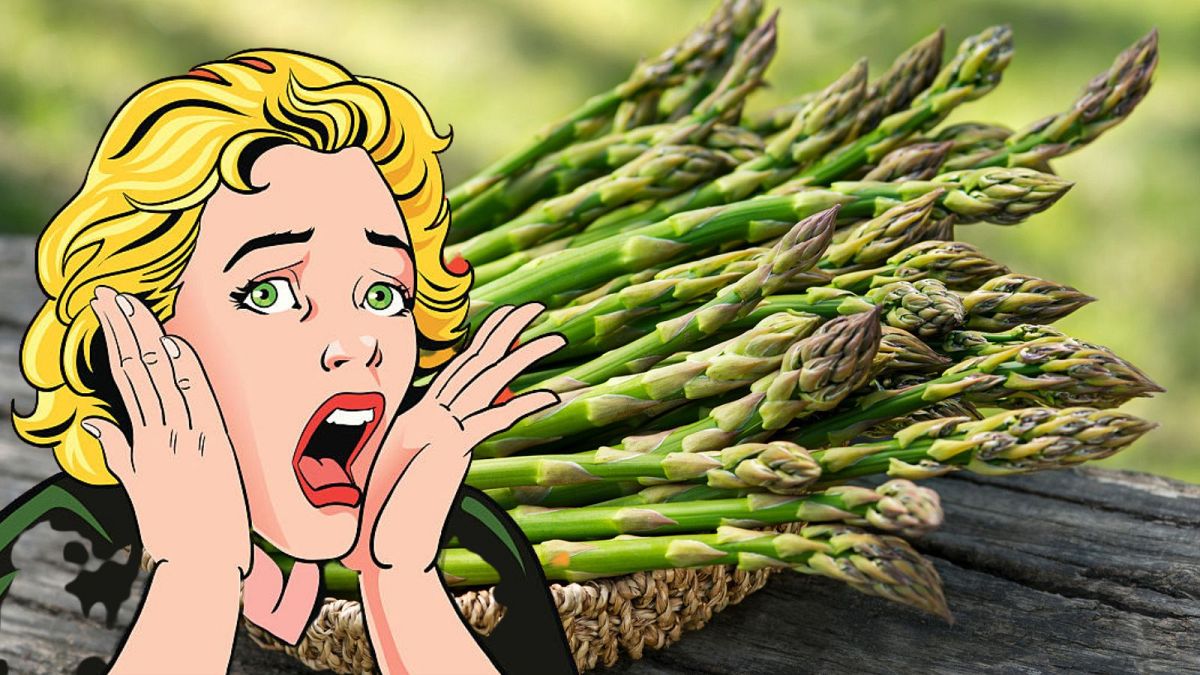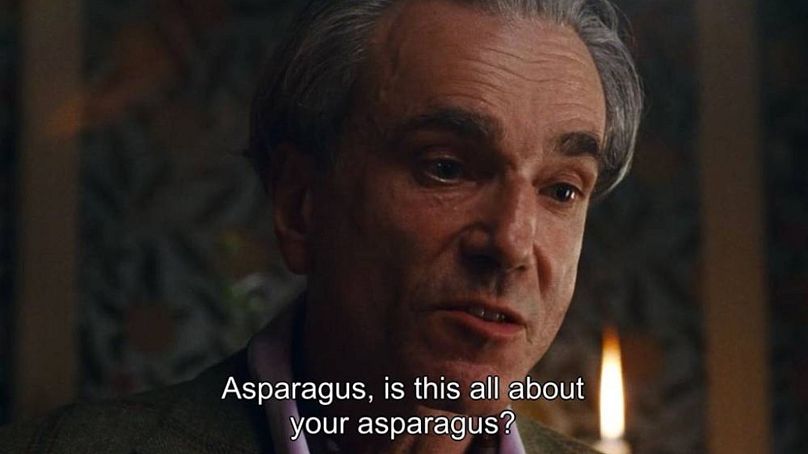Here's a cinematic and televisual theory to challenge even the staunchest asparagus lover.
Something a bit different for our Film of the Week series.
Instead of reviewing a new release (sorry, Guardians of the Galaxy Volume 3, but there are priorities in life and this article is my legacy to the world), I’ve decided to focus on vegetables.
Not just any vegetable, mind you. The tasty but dreaded asparagus.
You see, for as long as I can remember, I’ve been obsessed with food on screen. Screenwriters and directors don’t play dice with the universe and don’t randomly integrate foodstuffs into their projects. Over the years, I’ve run with this assumption and have noticed a trend that has mutated into a cinematic and televisual theory I’ve been cultivating for many years now within the rotting fruit bowl I call a brain.
My thesis is the following: Asparagus only shows up in films and television shows to serve a harbinger of doom. The second they appear on screen, you can bet something is amiss or that inevitable disaster is afoot.
For those of you who are partial to a cheeky equation: On-screen asparagus = Bad omen.
Considering we’re in the peak months for the treasured spring vegetable, what better time to expose my theory by providing incontrovertible cinematic and televisual evidence that will prove that despite its nutritional value and erotic overtones (the phallic implications of the veg are, hopefully, quite clear), asparagus isn’t always a force for good.
I shall proceed chronologically.
Twin Peaks
“Asparagus for dinner again. I hate asparagus.”
Watch any David Lynch film or his seminal series and you’ll notice that food always plays a vital role.
Background or foreground, implicit or explicit, matters of the stomach are a recurring motif for the bequiffed director of all things wonderful and strange.
Nowhere is this more omnipresent than in the town of Twin Peaks. From cherry pies to doughnuts, that baguette-administered state of bliss that sends Ben Horne into Proustian ecstasy and the mysterious Garmonbozia – the all-important pain and sorrow represented by creamed corn – everyone is obsessed with food. And all foodstuffs carry great symbolic weight.
In her introduction to Episode 8 of Season 2, the Log Lady – a Lynchian avatar present at the start of each episode to impart some cryptic wisdom – says: “Food is interesting. For instance, why do we eat? Why are we never satisfied with just the right amount of food to maintain good health and proper energy? We always seem to want more and more.” She goes on to state that balance is key.
Don’t you worry – I’m getting to the asparagus, promise.
You see, balance was the one thing absent in the life of Laura Palmer (Sheryl Lee). While food can be a source of joy that reunites friends and families around tables, so that everyone can share and connect with loved ones, the doomed Laura never had this luxury. Family was a dangerous place for her, a source of mental anguish and physical abuse, especially at the hands of her father Leland (Ray Wise) - himself possessed by the evil spirit BOB.
And here comes the promised veg.
After Laura’s death, our hero Agent Cooper (Kyle MacLachlan) discovers Laura’s diary and records an entry: “Diane, I’ve just opened Laura Palmer’s diary… It reads: ‘Asparagus for dinner again. I hate asparagus. Does this mean I’ll never grow up?’”
Asparagus can here be read as a harbinger of doom, a dark fate that marched inexorably towards the young Laura. It is a phallic symbol that mirrors the sexual abuse she suffered at the hands of Leland / BOB, but also functions as a totemic object of forced infantilization. In her untimely death, she is denied growth into adulthood – and her question following the statement of disliking asparagus not only foreshadows this, but also embodies Laura’s distaste for food in general. Unlike many of the characters, you won’t find Laura eating in either the Twin Peaks series (1990-1991) or Twin Peaks: Fire Walk With Me (1992).
In the clip above – a Missing Pieces extract from Fire Walk With Me – we even see Laura toying with her plated asparagus but not eating it. She also says the line “I hate asparagus” to echo the diary entry Cooper reads after her death. “Sure you do, it’s good for you,” says her disconnected mother, a line which proves that there is a communication (and emotional) breakdown in the family unit.
Laura’s lack of appetite is especially noticeable considering Agent Cooper regularly mainlines coffee, doughnuts and pie throughout the series, much like a famished child desperately craving a sugar rush. By contrast with the excitable Cooper, Laura has lost her taste for food, therefore a taste for life, and is forced to live in a toxic environment which she can only escape through sex and drugs. It’s this disconnect with food, which usually represents family protection and warmth, that showed from the very beginning she was a woman destined for tragedy.
The fact that it’s not broccoli or peas but asparagus is not a coincidence.
Ace Ventura: When Nature Calls
“Do I have something in my teeth?”
There are so many ways of enjoying asparagus: raw, grilled, pickled, blanched, bacon-wrapped, with parmesan shavings…
Or you could wind back the clocks to 1995 and use it as a prop to ruin everyone’s brunch, shocking the guests by creating a makeshift Lovecraftian hors-d’oeuvres face that won’t get you invited to any more get-togethers.
In the incriminating scene, Ace Ventura (Jim Carrey) struts around a lavish brunch table during a high-end social do, and makes quite the impression by unexpectedly shoving six oily asparagus stalks in his mouth, spouting some nonsense, before spitting them all out in one impressive go.
Hardly a mark of respect or professionalism.
Once again, the veggies are the harbinger of much doom… Here, a social faux-pas and the mark of a less superior sequel.
American Beauty
“Will someone please pass me the fucking asparagus?”
Numerous cultures have used asparagus in marriage ceremonies, considering the aphrodisiac qualities of the phallic veg, which is seen as a traditional emblem of fecundity in many countries. Think of it as the flipside to the vaginal fig.
But in Sam Mendes’ Oscar-winning 1999 debut, American Beauty, the asparagus takes centre stage and rhymes with marital strife.
In one of the film’s most memorable scenes, dinner is set and Lester (Kevin Spacey) lets years of pent-up frustration loose when he asks for the asparagus. When no one obliges, he gets up, crosses to the other side of the table to get the plate of stalky goodness, serves himself, and then hurls the plate against the wall with such force it shatters – much to the surprise of both his wife Carolyn (Annette Bening) and daughter Jane (Thora Birch).
The Freudian credentials of the sexually-charged asparagus are undisputed here, as we have a man, in the midst of a midlife crisis, finally standing up to the unfaithful partner that has emasculated him for too long. And if you adhere to the dream symbol meaning of the asparagus, whereby it signifies good decisions made by the dreamer who should continue to follow his heart, Lester is taking back control (ie: his masculinity) with a helping of penis-shaped food.
But before you start celebrating the asparagus as a symbolic liberator, you may want to remember that it doesn’t exactly end well for the marriage... Or Lester, for that matter.
Austin Powers in Goldmember
(Pee noises)
One distinguishing feature of asparagus is the sulphur-containing compound methyl mercaptan, which is mixed with asparagine to create that distinctive pee stink.
International Man of Mystery Austin Powers (Mike Myers) forgot this in 2002’s Austin Powers in Goldmember, when he was trying to stealthily infiltrate a villainous lair.
Having clumsily unplugged a water fountain featuring a cherub peeing, Austin does what he must to keep the guard from becoming suspicious. He does what any secret agent would do: he starts peeing from behind the statue to maintain the fountain illusion (and noise). With surprisingly clear urine, so well done there, Mr. Powers.
However, he can’t resist when he sees a plate of asparagus and starts munching on the delicious green stalks. Error, coco, as the mercaptan contaminates his urine and it begins to smell. The security guard immediately gets a whiff, and Austin’s cover is blown.
Moral of the story: asparagus is once again the guilty party, and when it comes going incognito, it represents a dangerous temptation that only smells – sorry, spells – trouble.
On the plus side, Austin’s kidneys are working fine – maybe on overtime if the mercaptan can immediately be smelled after just one bite.
Speaking of smelly urine…
Elf
“What about this? A tribe of asparagus children…”
French monasteries grew asparagus in order to please the Sun King, Louis XIV, who even had the veg grown in his greenhouses so he could enjoy it year-round. With that historical stamp of approval, and dismissing the prior examples I’ve given, what possible evil could come from the stalks?
Plenty, especially if you consider the case of Eugene in 2003’s Elf.
If you’re not familiar with Jon Favreau’s Will Ferrell-starring Christmas classic, Elf follows Buddy, a human who was adopted and raised by Santa’s elves, who goes to New York City to meet his biological father, Walter Hobbs, a famous children’s book publisher. Cut to a brainstorming session discussing book ideas, in which one of the team members, Eugene, has a flash of inspiration: “What about this? A tribe of asparagus children, but they’re self-conscious about the way their pee smells.”
I think it’s safe to say that we’d all read that.
Despite the solid pitch, Eugene’s idea is shot down, which leads me to the conclusion that if you don’t want to be humiliated – or worse, fired – then maybe don’t mention asparagus at work.
The Big Bang Theory
“I have a craving for white asparagus that apparently is destined to go unsatisfied.”
Phallic though the veg may be, and rumoured to be an aphrodisiac, this ninth episode in the second season of The Big Bang Theory, titled "The White Asparagus Triangulation", explores the flipside of this received wisdom.
When Leonard (Johnny Galecki) and Stephanie (Sara Rue) are enjoying their dinner date, Sheldon (Jim Parsons) interrupts by emitting some frankly alarming noises as he attempts to unscrew the lid of jar containing white asparagus.
The veg is here cast as the ultimate mood breaker, what some may call in this particular situation a “cock blocker.”
When Leonard goes to his flatmate to enquire what he’s up to, Sheldon informs him of his plan. He’s attempting to prove Leonard's physical superiority to Stephanie by having him open the jar of white asparagus. Leonard ends up shattering the jar by accident and gets a deep cut on his hand, which requires him to go to the hospital for stitches.
So, just to resume: Boys attempting to peacock by misguidedly asserting their (fragile) masculinity, leading to stitches, all through the symbolic heft of a priapic vegetable.
Tell me that the choice of asparagus is coincidental. It could have been any canned or pickled goodie, but no – the asparagus of doom strikes again, revealing on its way how daft men can be when they try to show off.
Law Abiding Citizen
"Napkin, Nick..."
Still to be convinced of my theory that on-screen asparagus is a bad omen?
Well, if this penultimate example doesn’t convince you, you’re just not trying hard enough to get on my warped wavelength.
The 2009 vigilante actioner Law Abiding Citizen sees our incarcerated protagonist Clyde (Gerard Butler) order a fancy meal, a perk he is accorded considering he has information the authorities need. His meal consists of lobster macaroni and cheese, a porterhouse steak (seared, medium rare) and… you guessed it… steamed asparagus.
‘So what?’ you may ask.
Well, quite aside from the fact that steamed asparagus sounds suspiciously crunchy (get your facts straight, people), Law Abiding Citizen is a truly awful film.
What more proof do you need??
Maybe my last – and arguably most convincing example – may seal the deal.
Phantom Thread
“Asparagus, is this all about your asparagus?”
The 17th-century herbalist Nicholas Culpepper wrote that asparagus “stirs up lust in man and woman”. He failed to mention that it also stirs up plenty of resentment.
Phantom Thread joins American Beauty in showing that with freshly cooked stalks comes relationship discord - here with a sizeable side helping of toxic masculinity.
In one of the best scenes of Paul Thomas Anderson’s superb 2017 drama, we witness another table discussion between two lovers: designer Reynolds Woodcock (Daniel Day-Lewis) and his partner Alma Elson (Vicky Krieps). Alma has prepared asparagus, and the veg is used as a tool in their argument.
“As I think you know, Alma, I prefer my asparagus with oil and salt”, states the passive aggressive Woodcock, continuing: “Knowing this, you have prepared the asparagus with butter. (…) Right now, I’m just admiring my own gallantry for eating it the way you’ve prepared it.”
The heated exchange that ensues stresses the sheer patriarchal nutsackery of Woodcock, an exhausting man-child who needs everyone to be at his beck and call. And once again, the phallic veg is a domestic bliss-shattering catalyst.
It’s also one with great importance within the wider context of the film. Indeed, as the movie progresses, the calculated importance and symbolic heft of food unravels, with the couple’s power dynamic gradually revealing itself. Watch closely, and you’ll find that Phantom Thread is more a warped romantic food flick than it is a fashion movie.
Plus, the main character's name is Woodcock.
Coincidence, considering the presence of the phallic veggie? I think not. Let it resonate with you.
There we have it.
Whether you are convinced of my theory or remain a staunch asparagus lover suggesting I seek professional help, the next time you think it’s a canny idea to nibble on some stalks with your significant other or bring the veg up in a work environment or, heaven forfend, get a craving to watch a Gerard Butler movie, think twice.
You may be looking at the asparagus of doom on your screen, but it’s also looking straight back at you.
And mark my words – those stalks don't have your best interests at heart.




